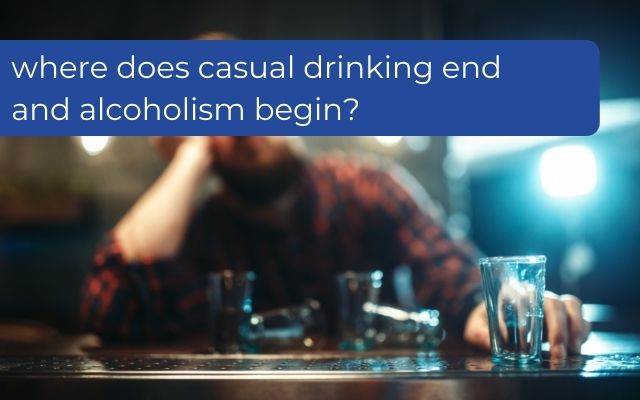Where Does Casual Drinking End and Alcoholism Begin?
Recognising when casual drinking crosses into alcoholism can protect health, relationships and work by spotting warning signs early and seeking support.
Talk to our admissions team

We live in a society where the use of alcohol is a cultural norm, and it begs the question where does casual drinking end and alcoholism begin? It is easily and widely accessible, it is also the first item on most lists when planning a social gathering or just to unwind at home. Alcohol is viewed as a rite of passage into adulthood in many homes. For the most part drinking is synonymous with good times and relaxation.
People who occasionally drink alcohol are not automatically addicted to alcohol. There are people who may misuse alcohol without drinking consistently. They may however put themselves in high risk situations or cause harm with occasional excessive drinking.
Not everyone who drinks will become an alcoholic and there are certain factors that play a part in the development of alcoholism. The effects vary from person to person and can be influenced by age, health status, family history and how much and how often alcohol is consumed.
Alcoholism is a brain disease that involves the uncontrolled, continued drinking regardless of consequences. Alcohol dependence is a state where the body needs alcohol just to function normally. Without it the alcoholic will experience severe and possibly life-threatening withdrawal symptoms.
“First you take a drink, then the drink takes a drink, then the drink takes you.” — F. Scott Fitzgerald, The Great Gatsby
Excessive alcohol consumption; including binge and heavy drinking
Binge drinking is excessive drinking that is defined as 5 or more drinks in 2 hours for a man and 4 or more drinks for a woman. Most people who are binge drinkers are not identified as alcohol dependent. Heavy drinking is defined as having 8 or more drinks per week for a woman and 15 or more drinks per week for a man.
Pregnant Women and Alcohol
Alcohol presents many dangers during pregnancy, and there is no known level of use that is considered safe. All types of alcohol are dangerous.
Drinking while pregnant is hazardous as the alcohol is passed on to the baby and can cause miscarriage, stillbirth, and Foetal Alcohol Spectrum Disorder (FASD) – the leading cause of preventable birth defects and developmental disability in the world.
Teenagers and Alcohol
Teenagers are known to misuse alcohol. Factors including peer pressure and easy access to the substance. Alcohol is at the top of the list of drugs used by teenagers, per the National Institute on Drug Abuse. Teenagers who abuse alcohol may not only engage in risky behaviours with negative consequences but also stunt brain development which is crucial in the formative years.
Some noticeable signs of over consumption may include:
- Slurred or incoherent speech
- Poor balance
- Delayed reflexes
- Stomach pains, nausea or vomiting
- Loss of consciousness or blackouts
When a person reaches a level of intoxication that becomes life threatening the respiratory system becomes depressed and they may stop breathing. Progressive increase in the quantity and regularity of drinking can begin to produce more serious symptoms of alcoholism. Drinking may become a central focus for the person and the repercussions on health and relationships then become negatively affected.
Signs of abuse may include:
- Loss of control over amount of alcohol being consumed
- Regular neglect family and obligations
- Dangerous behaviours
- Increase in aggression and / or expression of emotions
- Insomnia, sometimes followed by over sleeping
It can be difficult to tell when you or someone you love is struggling with alcoholism. Alcohol abuse can often be hidden by the person affected because they don’t believe they have a problem. However, if there is loss of control when drinking, compulsive consumption of alcohol despite negative consequences, and/or cravings when not drinking, it is possible that an addiction has developed.
Withdrawal
One of the most telling signs of alcohol dependency is when alcohol withdrawal is experienced. Withdrawal is the change within the body after a person suddenly stops drinking usually after extended and heavy alcohol use. Over time, both the body and the brain become dependent on drinking regularly. When there is a sudden cessation in drinking, the body is deprived of the effects of alcohol and needs time to adapt to functioning without it. This adjustment period causes painful side effects such as the shakes, insomnia, nausea, and anxiety.
Along with the uncomfortable side effects, alcohol withdrawal syndrome can trigger life-threatening health complications. Whether the abusive drinking has lasted for weeks, months, or years, it’s possible to experience alcohol withdrawal syndrome. Professional care from a specialised alcohol rehab treatment centre is highly recommended for those attempting to quit drinking as withdrawal can be extremely dangerous.
There is always help and there is always hope and help available. Changes Rehab Johannesburg is here to guide and support you through each step.
Call 081-444-7000 or email [email protected] to get the help you need today.
Recognising when casual drinking crosses into alcoholism can protect health, relationships and work by spotting warning signs early and seeking support.. Changes team counsellors are here to help you.When Casual Drinking Becomes Alcoholism Warning Signs








